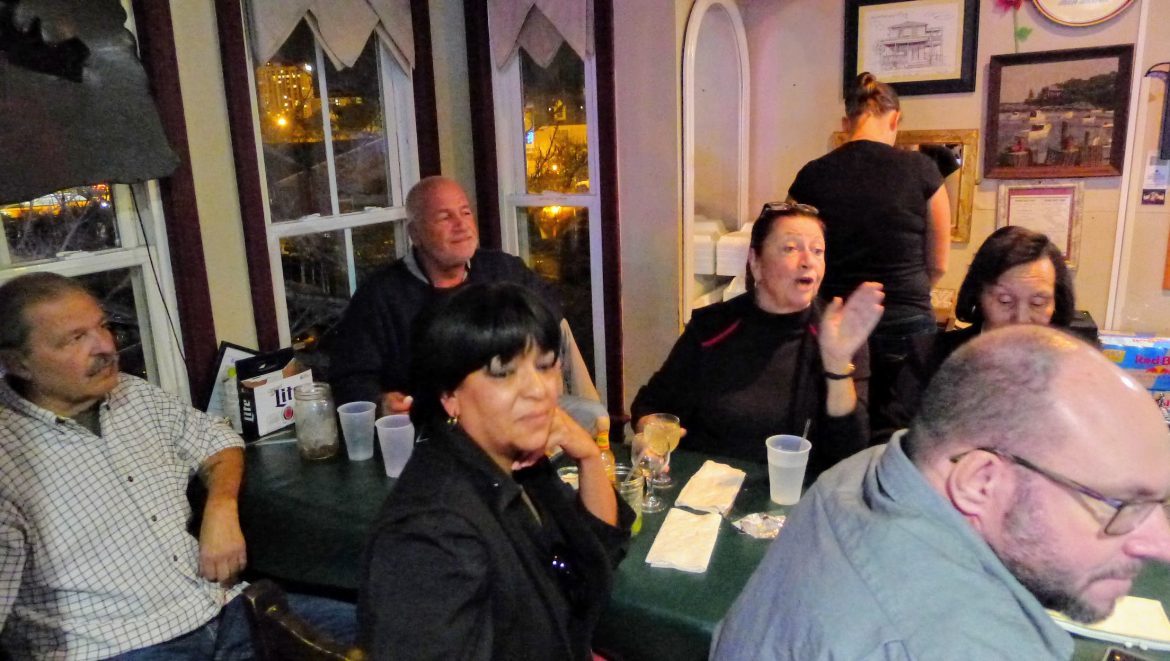The first thing the next governor of New Jersey should do is get out of Atlantic City, a group of city residents agreed at a recent dinner in Bungalow Park.
The almost one-year-old takeover of the city, which came after years of state oversight failed to avert a fiscal crisis in the gambling resort, is deeply unpopular with residents. Not one of the 13 guests at our Voting Block gathering at the Back Bay Ale House thought the state should continue its oversight.
Neighbors from Bungalow Park, a bayfront enclave of homeowners that has withstood Superstorm Sandy and AtlanticheCity’s many cycles of urban renewal and urban neglect, fear rising property taxes are threatening their community. And with the state in charge of the city government, they have even less of a platform from which to raise that issue – and others – than ever before.
“People need to understand that Atlantic City was built on the taxes of our elderly residents and the property taxes are shutting them out,” said longtime resident Elaine “Candy” Jones, who noted that lawmakers’ agreements to shore up the gaming industry in Atlantic City by cutting tax deals with the casinos has just increased the pressure on residents, who now bear a greater property-tax burden. “We’ve got people who lived here, worked here their entire lives and gave back to this community…and we’re just shutting them out, we’re overpricing them.”
This discussion was organized and recorded as part of Voting Block, a collaborative reporting series looking at the issues that New Jersey communities want to see addressed by the next governor (you can find more from around New Jersey at VotingBlockNJ.com.) You can also listen to an edited audio version of the discussion as a podcast here and via your favorite podcast app.
The group was angry that Atlantic City sees so little of the casino taxes generated in the town and that no one in Trenton has been held accountable for the initial promises made to voters at the time of the 1976 referendum that opened the state to gaming.
“I want them to honor the promise that was made in order for them to get gambling in Atlantic City, which was no taxes for the residents,” said Darcee Heffner, who has lived in Bungalow Park since 1999. “No one talks about that and it’s not on anyone’s agenda to honor the original promise to get gambling here.”
Residents expressed a general feeling that Trenton lawmakers, including gubernatorial candidates, visit Atlantic City for conventions, conferences and casino events with the occasional stop-off along the Boardwalk, and rarely visit residential neighborhoods.
Instead of overseeing Atlantic City from afar and spending millions of dollars on out-of-city lawyers, the city needs a state governor that is willing to visit and hear first-hand about the challenges Atlantic City residents are facing, the group said. Tony Vraim, who has lived in Bungalow Park for decades, said the next governor should come and stay for a while and see what it’s really like to live here.
Dot Hogan added, “I would like to see the governor candidates or the governor come down here and see the integrated atmosphere, the wonderful interaction between a lot of people…because (the candidates) live in an ivory tower.”
Stephen Cottrell said that South Jersey as a region gets short shrift from Trenton. “I would just like to see someone take on the platform – pass or fail, whether they won or lost – on some issues that were beneficial to South Jersey,” he said.
Frank Becktel added that Trenton needs to stop trying to pigeon-hole Atlantic City. “I’d like gubernatorial candidates and every state-level legislator to understand that Atlantic City’s unique,” he said. “They keep trying to pigeon-hole us in funding formulas as a 38,000-person town or an urban area or some other category but there is no other 38,000 person town that sends $70, $80, $90 million to Trenton every year. There’s no other 38,000 town that their largest landlord is the housing authority, there’s no other 38,000 person town where only 28 percent of the households pay property taxes.
“We are really unique. We have the urban issues and we have the casino issues and people are trying to put us in a box. We were unique in our history as a resort town, we were unique as a casino town and we are unique in every way and I think they have to look at us differently than how they look at every other town.”
The group had some policy ideas that they wanted the next governor to embrace. High up on the list was allowing sports betting in New Jersey (currently before the Supreme Court). Another idea was to alter the casinos’ tax payments under the so-called Atlantic City PILOT law so that casino taxes can be used to fund schools, reducing the burden on homeowners. The group also got into a heated discussion about the use of eminent domain for redevelopment on Atlantic City’s Northside (listen to the podcast), but in general concluded that the locally-led redevelopment effort had been successful in improving the city’s housing stock. The Casino Reinvestment Development Authority received flak for now acting as a state-focused rather than an Atlantic City-focused development entity, and Libby Hall and Carol Ruffo said that land held by the CRDA – and currently untaxed – should be sold.
After two hours of conversation that touched on many more issues including the topic of civil discussion about last year’s election, the group concluded that the most important issue was to end the state takeover. But one Bungalow Park resident did have a final tip for the next governor, before he or she ends the state’s oversight. “We need our bulkhead fixed!” Tru Hall said.
